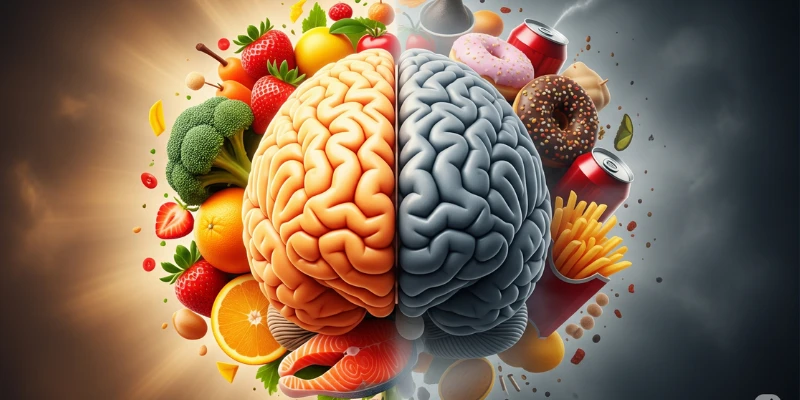Mood on a Plate: Nutrition Tips for Mental Wellness

The saying “you are what you eat” is commonly associated with physical health. Did you know what you eat can also influence how you feel? Your diet plays a major role not only for your physical health but also mental health.
Studies have shown that the food we eat affects chemical composition of our brain and alters our mood. Nutrition affects cognitive possibilities, including alertness and the production or release of neurotransmitters, the chemical messengers that carry information from one nerve cell to another.
Now, that’s a very critical role! Hence, if you are suffering from mental health issues, it is very crucial to reflect on what you have been feeding yourself. You are not just feeding your body, but also one of the most important organs in your body, which is the brain.
Let’s find out how you can nourish your mind, one plate at a time!
For a start, if you are suffering from mental health issues, it is good to pay attention to food which can make your condition worse. Excessive sugar intake has been proven to contribute to irritability, poor mood and fatigue. Consumption of high sugar food or beverage causes blood sugar spike. Studies show that frequent or persistent hyperglycemia, increases risk of depression and anxiety. The fluctuations in blood sugar impact brain function, mood and stress responses.
Next, evaluate your intake of processed and fast-food. High consumption of unhealthy fats such as those in processed and fast-food increases inflammation of the brain which is linked to mental fatigue and depression. Highly processed food is also low in nutrients which are needed for the brain to function well.
Finally, caffeine, which helps to improve alertness in many people, could be a danger if taken in excess. It can trigger anxiety, irritability, insomnia and restlessness. Insomnia disrupts circadian rhythm and could further worsen mental health over time
Ever heard of the second brain

The enteric nervous system (ENS), which consists of a complex network of neurons located in the gut can function largely independently of the brain. It produces neurotransmitters including the most well-known type which is serotonin which helps to regulate mood and well-being. The gut and brain are in constant communication. This crosstalk affects how we feel and perceive gastrointestinal symptoms and impacts our quality of life. The gut microbiome, a complex ecosystem of microorganisms in the digestive tract, produces and interacts with various compounds that influence mood, behavior, and even cognitive function.
Diets which are low in fiber and probiotics can harm your gut bacteria — leading to increased stress, anxiety, and poor emotional regulation. Drinking inadequate water also affects the guts microbiome and eventually affects or worsens mental health.
Looking further into the role of diet and nutrition in mental health, it is also good to note that there are essential nutrients which can boost your brain health. Better mood regulation and cognitive function has been linked to adequate consumption of omega-3 fatty acids which are naturally available in food such as salmon, sardines, nuts and seeds.
DHA, which is a type of omega-3 fatty acids, is a major component for brain cell membranes. EPA, another type of omega-3 fatty acids plays the anti-inflammatory role which helps with mood swings, depression and anxiety. B vitamins have also been proven to help with mental health at the nerves level, supporting production of serotonin. Naturally, vitamin B is abundant in leafy greens, legumes and eggs.
Another nutrient of concern when it comes to mental health is Vitamin D. Well known as the “sunshine vitamin”, vitamin D helps to stabilize mood and influence the release of serotonin which is the feel-good hormone. Vitamin D also helps in the melatonin production, which helps improve sleep. The best way to obtain vitamin D is by getting sun exposure.
However, if that is not possible, vitamin D supplementation may be required. When it comes to taking supplements to fulfill your micronutrients need, it is best to consult your dietitian or physician. A thorough assessment of your current diet helps to determine the needs for supplementation.
Set regular habits around your eating. Prep ahead of time so that you always have healthy meals available. Proper planning also helps you to stay calm and be more mindful about your eating habits. Remember, mental health management requires a holistic approach and one of them is your lifestyle and diet. Eat well, feel well.



















